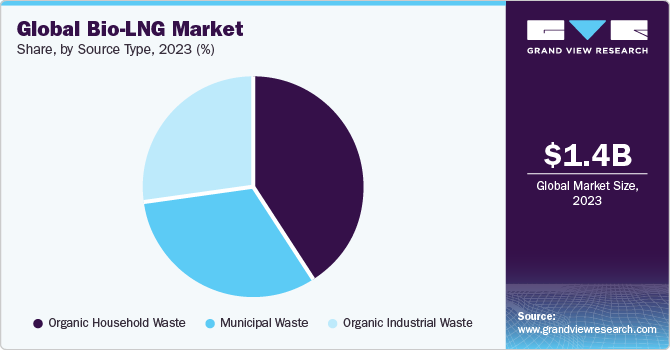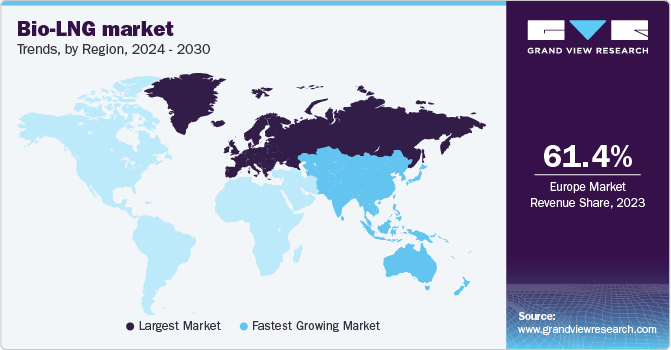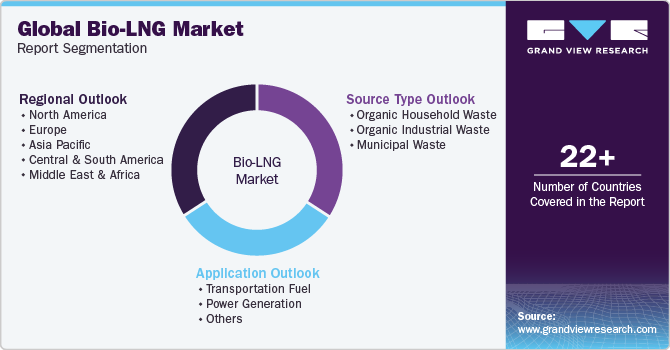- Home
- »
- Power Generation & Storage
- »
-
Bio-LNG Market Size, Share, Growth & Trends Report, 2030GVR Report cover
![Bio-LNG Market Size, Share & Trends Report]()
Bio-LNG Market (2024 - 2030) Size, Share & Trends Analysis Report By Application (Transportation Fuel, Power Generation), By Source Type (Organic Household Waste, Municipal Waste), By Region, And Segment Forecasts
- Report ID: GVR-4-68040-073-2
- Number of Report Pages: 120
- Format: PDF
- Historical Range: 2018 - 2022
- Forecast Period: 2024 - 2030
- Industry: Energy & Power
- Report Summary
- Table of Contents
- Segmentation
- Methodology
- Download FREE Sample
-
Download Sample Report
Bio-LNG Market Summary
The global bio-LNG market size was estimated at USD 1.37 billion in 2023 and is projected to reach USD 19.78 billion by 2030, growing at a CAGR of 41.1% from 2024 to 2030. As more organic waste streams become available, such as agricultural and forestry residues and food waste, bio-LNG production has an increasing feedstock supply.
Key Market Trends & Insights
- Europe accounted for largest regional revenue share of 61.41% in 2023.
- By application, transportation fuel segment led the market in 2023, accounting for a revenue share of 55.55%.
- By source type, organic household waste segment led the market in 2023, accounting for a share of 40.40%.
Market Size & Forecast
- 2023 Market Size: USD 1.37 Billion
- 2030 Projected Market Size: USD 19.78 Billion
- CAGR (2024-2030): 41.1%
- Europe: Largest market in 2023
This has helped to drive down cost of production and increase viability of bio-LNG as a fuel source. The U.S. emerged as the largest market in North America in 2022. The U.S. government has implemented several programs to encourage production and use of renewable fuels, including bio-LNG. For example, Renewable Fuel Standard (RFS) requires a certain quantity of renewable fuels to be blended into transportation fuels each year. Similarly, several states have implemented renewable fuel standards or incentives, further driving demand for bio-LNG.
Increasing market for bio-LNG is also being driven by transportation sector. As more companies look to reduce their carbon emissions, bio-LNG is becoming an attractive alternative to diesel and gasoline. It can be used in a variety of transportation applications, including heavy-duty trucks, buses, and even ships. Several major shipping companies have already started using bio-LNG as fuel for their vessels, further driving demand for bio-LNG.
Market Dynamics
Bio-LNG is a renewable natural gas-based fuel developed from bio-waste and other organic materials. It has properties similar to that of traditional LNG but with lower greenhouse gas emissions and a highly sustainable production process. Bio-LNG is a viable alternative to diesel and other fossil fuels used in heavy-duty vehicles as it can be used in existing LNG infrastructure and vehicles with little or no modifications.
Several regulations and policies are driving the adoption of low-carbon fuels in heavy-duty vehicles. For instance, European Union has set ambitious targets for reducing greenhouse gas emissions from its transportation sector by minimizing emissions from heavy-duty vehicles by 30% by 2030. Similarly, U.S. has implemented regulations such as Corporate Average Fuel Economy (CAFE) standards that require manufacturers to produce vehicles that meet certain fuel efficiency targets.
Governments of different countries are also offering financial incentives for encouraging the production of bio-LNG and promoting its use in heavy-duty vehicles. In April 2023, Envitec Biogas announced the launch of Bio-LNG in Germany. It plans to liquefy biomethane at Güstrow where it will produce 9,000 tons of Bio-LNG.
Application Insights
In terms of revenue, the transportation fuel segment led bio-LNG market in 2023, accounting for a revenue share of 55.55%. Demand for bio-LNG has been growing in transportation fuel and power generation segments, owing to low pollution caused by fuel. Bio-LNG is a low-carbon fuel that emits significantly less greenhouse gases (GHGs) than diesel or gasoline. It can reduce GHG emissions by up to 90% compared to diesel, which makes it an attractive option for companies and governments seeking to reduce their carbon footprint.
While bio-LNG may be more expensive than diesel in some cases, cost differential is narrowing as production scales up and technology improves. As a result, bio-LNG is becoming increasingly cost-competitive with traditional fuels, particularly in regions where there are incentives or regulations in place to promote the use of low-carbon fuels. Bio-LNG can be transported using existing natural gas pipelines and infrastructure, which makes it relatively easy to distribute and use. Some companies are investing in dedicated bio-LNG production and distribution infrastructure to further promote its usage.
Source Type Insights
In terms of revenue, organic household waste segment led the market for bio-LNG in 2023, accounting for a share of 40.40%.Growth of this segment can be attributed to incentives and tax rebates offered by governments of different countries to promote adoption of renewable energy and conversion of organic waste to energy.

Utilization of organic household waste to produce bio-LNG offers several advantages. It helps divert waste from landfills, reducing its environmental impact and emissions associated with its disposal. By converting this waste into renewable energy, bio-LNG production contributes to circular economy and supports sustainable waste management practices.Versatility of organic industrial waste as a feedstock in market for bio-LNG is remarkable. It encompasses various organic materials such as food waste, agricultural residues, and organic byproducts from manufacturing processes.
Municipal waste serves as a driving factor for market growth of bio-LNG, due to several key factors. Firstly, stricter environmental regulations and targets for reducing greenhouse gas emissions have incentivized use of sustainable waste management practices. Municipal waste, when converted into bio-LNG, offers a lower carbon footprint compared to traditional fossil fuels, making it an attractive feedstock. Secondly, financial incentives and subsidies promote development of bio-LNG production facilities, as they offer an environment-friendly solution to waste management challenges.
Regional Insights
Europe accounted for largest regional revenue share of 61.41% in 2023. Countries such as Germany, UK, Spain, and France are expected to witness high growth rates in industry, owing to rising product demand from transportation and power generation application sectors, boosting market growth during forecast period.
North America occupied a significant revenue share in 2022, with the U.S. being a major contributor to regional market growth. Surge in usage of alternative fuels for energy generation to reduce greenhouse gas emissions is expected to drive growth of North American market for bio-LNG in coming years.

Asia Pacific is expected to witness a significant CAGR over the forecast period, owing to presence of large emerging countries such as China and India. Bio-LNG has reduced reliance of regional economies on other countries for energy generation, as bio-LNG can be produced domestically. This is expected to boost market in similar regions without significant oil and gas reserves.
Key Companies & Market Share Insights
Bio-LNG market is highly competitive and moderately consolidated due to presence of a few large players. Dominant trend in bio-LNG market includes collaborations, mergers & acquisitions, and geographical expansions, which facilitates competition in market.
Key Bio-LNG Companies:
- Linde plc
- Nordsol
- Flogas Britain Ltd.
- MEGA a.s.
- AXEGAZ T&T
- TotalEnergies
- Titan LNG
- DBG Group B.V.
- BoxLNG Pvt. Ltd.
- Shell Plc
Bio-LNG Market Report Scope
Report Attribute
Details
Market size revenue in 2024
USD 2.51 billion
Revenue forecast in 2030
USD 19.78 billion
Growth rate
CAGR of 41.1% from 2024 to 2030
Base year for estimation
2023
Historical data
2018 - 2022
Forecast period
2024 - 2030
Quantitative units
Volume in tons, revenue in USD million/billion and CAGR from 2024 to 2030
Report coverage
Revenue forecast, volume forecast, company ranking, competitive landscape, growth factors, and trends
Segments covered
Application, source type, region
Region scope
North America; Europe; Asia Pacific; Central & South America; MEA
Country scope
U.S.; Canada; Mexico; Germany; UK; Spain; Italy; France; Netherlands;China; India; Japan; South Korea; Australia; Brazil; Argentina;Saudi Arabia; UAE
Key companies profiled
Linde plc; Nordsol; Flogas Britain Ltd.; MEGA a.s.; AXEGAZ T&T; TotalEnergies; Titan LNG; DBG Group B.V.; BoxLNG Pvt. Ltd.; Shell Plc
Customization scope
Free report customization (equivalent up to 8 analyst’s working days) with purchase. Addition or alteration to country, regional, and segment scope.
Pricing and purchase options
Avail customized purchase options to meet your exact research needs. Explore purchase options
Global Bio-LNG Market Report Segmentation
This report forecasts revenue and volume growth at the global, regional, and country levels and provides an analysis of latest industry trends in each of the sub-segments from 2018 to 2030. For this study, Grand View Research has segmented global bio-LNG market report based on application, source type, and region:

-
Source Type Outlook (Volume, Tons; Revenue, USD Million, 2018 - 2030)
-
Organic household waste
-
Organic industrial waste
-
Municipal waste
-
-
Application Outlook (Volume, Tons; Revenue, USD Million, 2018 - 2030)
-
Transportation Fuel
-
Power Generation
-
Others
-
-
Regional Outlook (Volume, Tons; Revenue, USD Million, 2018 - 2030)
-
North America
-
U.S.
-
Canada
-
Mexico
-
-
Europe
-
Germany
-
UK
-
Spain
-
Italy
-
France
-
Netherlands
-
-
Asia Pacific
-
China
-
India
-
Japan
-
Australia
-
South Korea
-
-
Central and South America
-
Brazil
-
Argentina
-
-
Middle East and Africa
-
UAE
-
Saudi Arabia
-
-
Frequently Asked Questions About This Report
b. The global bio-LNG market size was estimated at USD 1.37 billion in 2023 and is expected to reach USD 2.51 billion in 2024.
b. The global bio-LNG market is expected to grow at a compound annual growth rate of 41.1% from 2024 to 2030 to reach USD 19.78 billion by 2030.
b. Europe dominated the bio-LNG market with a share of 61.4% in 2023. This is attributable to countries in the region investing into renewable energy sources to reduce their reliance on fossil fuels for energy generation.
b. Some key players operating in the bio-LNG market include Linde plc, Nordsol, Flogas Britain Ltd., MEGA a.s., AXEGAZ T&T, TotalEnergies,Titan LNG., DBG Group B.V., BoxLNG Pvt. Ltd., Shell Plc.
b. As concerns about climate change and air pollution continue to mount, there is a growing demand for clean and sustainable energy sources. This is expected to boost the market for Bio-LNG market.
Share this report with your colleague or friend.
Need a Tailored Report?
Customize this report to your needs — add regions, segments, or data points, with 20% free customization.

ISO 9001:2015 & 27001:2022 Certified
We are GDPR and CCPA compliant! Your transaction & personal information is safe and secure. For more details, please read our privacy policy.
Trusted market insights - try a free sample
See how our reports are structured and why industry leaders rely on Grand View Research. Get a free sample or ask us to tailor this report to your needs.










